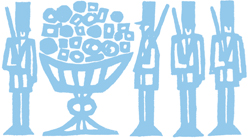A Child's Christmas in Wales
Read A Child's Christmas in Wales Online
Authors: Dylan Thomas

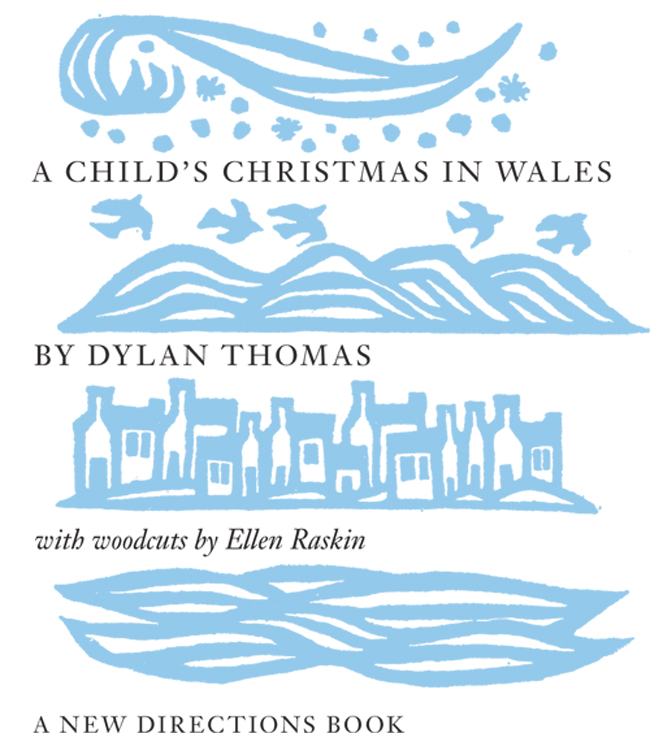
Â

Â
A CHILD'S CHRISTMAS IN WALES
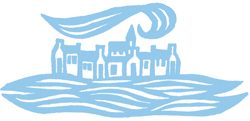
One Christmas was so much like another, in those years around the
sea-town corner now, out of all sound except the distant speaking of the voices I
sometimes hear a moment before sleep, that I can never remember whether it snowed
for six days and six nights when I was twelve or whether it snowed for twelve days
and twelve nights when I was six.
Â
All the Christmases roll down toward the two-tongued sea, like a cold
and headlong moon bundling down the sky that was our street; and they stop at the
rim of the ice-edged, fish-freezing waves, and I plunge my hands in the snow and
bring out whatever I can find. In goes my hand into that wool-white bell-tongued
ball of holidays resting at the rim of the carol-singing sea, and out come Mrs.
Prothero and the firemen.
Â
It was on the afternoon of the day of Christmas Eve, and I was in Mrs.
Prothero's garden, waiting for cats, with her son Jim. It was snowing. It was always
snowing at Christmas. December, in my memory, is white as Lapland, though there were
no reindeers. But there were cats. Patient, cold and callous, our hands wrapped in
socks, we waited to snowball the cats. Sleek and long as jaguars and
horrible-whiskered, spitting and snarling, they would slink and sidle over the white
back-garden walls, and the lynx-eyed hunters, Jim and I, fur-capped and moccasined
trappers from Hudson Bay, off Mumbles Road, would hurl our deadly snowballs at the
green of their eyes.
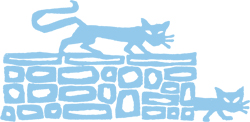
The wise cats never appeared. We were so still, Eskimo-footed arctic
marksmen in the muffling silence of the eternal snowsâeternal, ever since
Wednesdayâthat we never heard Mrs. Prothero's first cry from her igloo at the bottom
of the garden. Or, if we heard it at all, it was, to us, like the far-off challenge
of our enemy and prey, the neighbor's polar cat. But soon the voice grew louder.
“Fire!” cried Mrs. Prothero, and she beat the dinner-gong.
Â
And we ran down the garden, with the snowballs in our arms, toward the
house; and smoke, indeed, was pouring out of the dining-room, and the gong was
bombilating, and Mrs. Prothero was announcing ruin like a town crier in Pompeii.
This was better than all the cats in Wales standing on the wall in a row. We bounded
into the house, laden with snowballs, and stopped at the open door of the
smoke-filled room.
Â
Something was burning all right; perhaps it was Mr. Prothero, who always
slept there after midday dinner with a newspaper over his face. But he was standing
in the middle of the room, saying, “A fine Christmas!” and smacking at the smoke
with a slipper.
Â
“Call the fire brigade,” cried Mrs. Prothero as she beat the gong.
“They won't be there,” said Mr. Prothero, “it's Christmas.”
Â
There was no fire to be seen, only clouds of smoke and Mr. Prothero
standing in the middle of them, waving his slipper as though he were conducting.
“Do something,” he said.
Â
And we threw all our snowballs into the smokeâI think we missed Mr.
Protheroâand ran out of the house to the telephone box.
“Let's call the police as well,” Jim said.
“And the ambulance.”
“And Ernie Jenkins, he likes fires.”

But we only called the fire brigade, and soon the
fire engine came and three tall men in helmets brought a hose into the house and Mr.
Prothero got out just in time before they turned it on. Nobody could have had a
noisier Christmas Eve. And when the firemen turned off the hose and were standing in
the wet, smoky room, Jim's aunt, Miss Prothero, came downstairs and peered in at
them. Jim and I waited, very quietly, to hear what she would say to them. She said
the right thing, always. She looked at the three tall firemen in their shining
helmets, standing among the smoke and cinders and dissolving snowballs, and she
said: “Would you like anything to read?”
Â

Years and years and years ago, when I was a boy, when there were wolves
in Wales, and birds the color of red-flannel petticoats whisked past the harp-shaped
hills, when we sang and wallowed all night and day in caves that smelt like Sunday
afternoons in damp front farmhouse parlors, and we chased, with the jawbones of
deacons, the English and the bears, before the motor car, before the wheel, before
the duchess-faced horse, when we rode the daft and happy hills bareback, it snowed
and it snowed. But here a small boy says: “It snowed last year, too. I made a
snowman and my brother knocked it down and I knocked my brother down and then we had
tea.”
Â
“But that was not the same snow,” I say. “Our snow was not only shaken
from whitewash buckets down the sky, it came shawling out of the ground and swam and
drifted out of the arms and hands and bodies of the trees; snow grew overnight on
the roofs of the houses like a pure and grandfather moss, minutely white-ivied the
walls and settled on the postman, opening the gate, like a dumb, numb thunderstorm
of white, torn Christmas cards.”
“Were there postmen then, too?”
Â
“With sprinkling eyes and wind-cherried noses, on spread, frozen feet
they crunched up to the doors and mittened on them manfully. But all that the
children could hear was a ringing of bells.”

“You mean that the postman went rat-a-tat-tat and the doors rang?”
Â
“I mean that the bells that the children could hear were inside
them.”
“I only hear thunder sometimes, never bells.”
Â
“There were church bells, too.”
“Inside them?”
Â
“No, no, no, in the bat-black, snow-white belfries, tugged by bishops
and storks. And they rang their tidings over the bandaged town, over the frozen foam
of the powder and ice-cream hills, over the crackling sea. It seemed that all the
churches boomed for joy under my window; and the weathercocks crew for Christmas, on
our fence.”
“Get back to the postmen.”
“They were just ordinary postmen, fond of walking and dogs and Christmas
and the snow. They knocked on the doors with blue knuckles. . . .”
“Ours has got a black knocker. . . . ”
Â
“And then they stood on the white Welcome mat in the little, drifted
porches and huffed and puffed, making ghosts with their breath, and jogged from foot
to foot like small boys wanting to go out.”
“And then the presents?”
“And then the Presents, after the Christmas box. And the cold postman,
with a rose on his button-nose, tingled down the tea-tray-slithered run of the
chilly glinting hill. He went in his ice-bound boots like a man on fishmonger's
slabs. He wagged his bag like a frozen camel's hump, dizzily turned the corner on
one foot, and, by God, he was gone.”
“Get back to the Presents.”
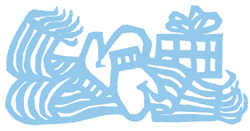
“There were the Useful Presents: engulfing mufflers of the old coach
days, and mittens made for giant sloths; zebra scarfs of a substance like silky gum
that could be tug-o'-warred down to the galoshes; blinding tam-o'-shanters like
patchwork tea cozies and bunny-suited busbies and balaclavas for victims of
head-shrinking tribes; from aunts who always wore wool next to the skin there were
mustached and rasping vests that made you wonder why the aunts had any skin left at
all; and once I had a little crocheted nose bag from an aunt now, alas, no longer
whinnying with us. And pictureless books in which small boys, though warned with
quotations not to,
would
skate on Farmer Giles' pond and did and drowned;
and books that told me everything about the wasp, except why.”
“Go on to the Useless Presents.”
